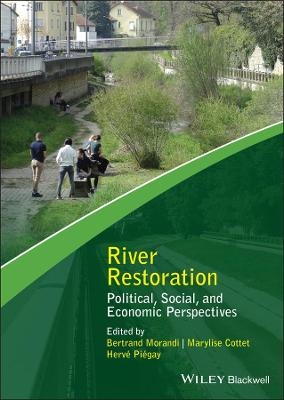
River Restoration
Wiley-Blackwell (Verlag)
978-1-119-40998-4 (ISBN)
The scientific community working in this domain has structured itself, often regionally and circumstantially, to critically assess and improve restoration policies and practices. As a research field, river restoration tackles three thematic axes:
Human-river interactions – especially perceptions and practices of rivers, and how these interactions can be changed by restoration projects
Political processes, with a particular interest in governance and decision-making, and a specific emphasis on the question of public participation in restoration projects
Evaluation of the social and economic benefits of river restoration
River Restoration: Political, Social, and Economic Perspectives encompasses these three topics, and more, to provide the reader with the most up-to-date and holistic view of this constantly evolving area. The book will be of particular interest to human and social scientists, biophysical scientists (hydrologists, geomorphologists, ecologists), environmental scientists, public policy makers, design or planning officers, and anyone working in the field of river restoration.
About the Editors Bertrand Morandi, Marylise Cottet and Hervé Piégay are geographers with an interdisciplinary expertise in the field of river research and restoration. They are all based at the Université de Lyon, France. They are experienced in using integrated approaches to deepen knowledge of river socio-ecosystems. They lead interdisciplinary programs which consider both ecological and social issues of river restoration and aim at providing knowledge and methods to aid public decision making. In this context, they regularly collaborate with water managers and stakeholders. They are also involved in Rhône Basin LTER network and Rhône Valley Human-Environments Observatory (Labex DRIIHM) and actively contribute to an interdisciplinary doctoral School in Watershed Sciences (EUR H2O’Lyon).
Series Foreword vii
Acknowledgments viii
List of Contributors ix
Part I Introduction 1
1 What are the Political, Social, and Economic Issues in River Restoration? Genealogy and Current Research Issues 3
Marylise Cottet, Bertrand Morandi, and Hervé Piégay
Part II People–River Relationships: From Ethics to Politics 49
2 Ethics of River Restoration: The Imitationist Paradigm 51
Henry Dicks
3 Restoring Sociocultural Relationships with Rivers: Experiments in Fluvial Pluralism 66
Dan Hikuroa, Gary Brierley, Marc Tadaki, Brendon Blue, and Anne Salmond
4 Political Ecology and River Restoration 89
Jamie Linton
Part III Governance and Power Relationships Between Stakeholders 107
5 The Policy and Social Dimension of Restoration Thinking: Paying Greater Attention to “Interdependency” in Restoration Governing Practice 109
Caitriona Carter , Gabrielle Bouleau, and Sophie Le Floch
6 From Public Policies to Projects: Factors of Success and Diversity Through a Comparative Approach 128
Catherine Carré, Jean-Paul Haghe, and Pere Vall-Casas
7 How to Better Involve Stakeholders in River Restoration Projects: The Case of Small Dam Removals 147
Marie-Anne Germaine, Ludovic Drapier, Laurent Lespez, and Beth Styler-Barry
8 Letting the Political Dimension of Participation in River Restoration have its Space 169
Nora S. Buletti, Franziska E. Ruef, and Olivier Ejderyan
Part IV Evaluation of Socioeconomic Effects 189
9 What is the Total Economic Value of River Restoration and Why is it Important? 191
John C. Bergstrom and John B. Loomis
10 Valuation of Ecosystem Services to Assess River Restoration Projects 210
Xavier Garcia, Stefanie Müller, and Matthias Buchecker
11 Public Perspectives of River Restoration Projects 233
Riyan van den Born, Bernadette van Heel, Kerstin Böck, Arjen Buijs, and Matthias Buchecker
Part V Diversity of Methods, Diversity of Knowledge 253
12 Social Surveys: Methods for Taking into Account Actors’ Practices and Perceptions in River Restoration 255
Caroline Le Calvez, Silvia Flaminio, Marylise Cottet, and Bertrand Morandi
13 Documents on River Restoration: Temporal and Spatial Analyses of Written Discourses 273
Emeline Comby, Bertrand Morandi, Yves-François Le Lay, Silvia Flaminio, and Helena Zemp
14 Participatory Approaches: Principles and Practices for River Restoration Projects 294
Alba Juárez-Bourke and Kirsty L. Blackstock
15 Economic Benefits: Operationalizing their Valuation in River Restoration Projects 308
Sylvie Morardet
Part VI Conclusions 333
16 Social, Economic, and Political Stakes of River Restoration: A Dynamic Research Field Facing Several Challenges to Strengthen Links with Practitioners 335
Marylise Cottet, Bertrand Morandi, and Hervé Piégay
Index 351
| Erscheinungsdatum | 15.07.2019 |
|---|---|
| Reihe/Serie | Advancing River Restoration and Management |
| Verlagsort | Hoboken |
| Sprache | englisch |
| Maße | 189 x 246 mm |
| Gewicht | 879 g |
| Themenwelt | Naturwissenschaften ► Biologie ► Ökologie / Naturschutz |
| Naturwissenschaften ► Geowissenschaften ► Hydrologie / Ozeanografie | |
| ISBN-10 | 1-119-40998-5 / 1119409985 |
| ISBN-13 | 978-1-119-40998-4 / 9781119409984 |
| Zustand | Neuware |
| Haben Sie eine Frage zum Produkt? |
aus dem Bereich


